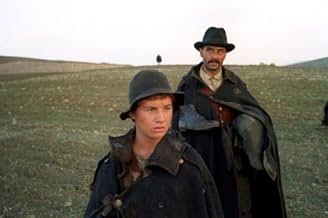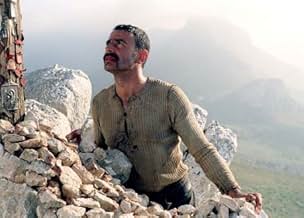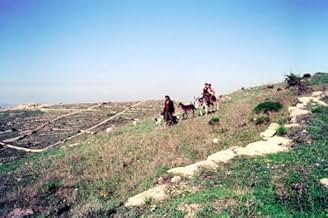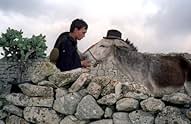Un paysan sicilien entreprend le voyage vers la terre promise et rencontre une belle Anglaise. Aucun des deux n'est préparé aux dures réalités d'Ellis Island. Arriveront-ils à franchir la po... Tout lireUn paysan sicilien entreprend le voyage vers la terre promise et rencontre une belle Anglaise. Aucun des deux n'est préparé aux dures réalités d'Ellis Island. Arriveront-ils à franchir la porte dorée qui mène à l'Amérique de leurs rêves ?Un paysan sicilien entreprend le voyage vers la terre promise et rencontre une belle Anglaise. Aucun des deux n'est préparé aux dures réalités d'Ellis Island. Arriveront-ils à franchir la porte dorée qui mène à l'Amérique de leurs rêves ?
- Réalisation
- Scénario
- Casting principal
- Récompenses
- 22 victoires et 29 nominations au total
- Il Gatto
- (as Paride Benassai)
- Dottore
- (as Giuseppe Cutino)
- Mangiapane
- (as Massimo La Guardia)
Avis à la une
Therefore, it started a debate about the too much intense flow of immigrants from Romania, generalizing them as criminals, everyone, indiscriminately.
I'm only 15, but I thought: what idea of affluence does Italy give to these poor people? How ever do they regard us as the Land of Plenty? Yesterday evening I finally saw NUOVOMONDO, and my question had an answer. When you have only a donkey and some goats, those propaganda postcards showing United States as a land with milk rivers and huge vegetables, makes such an impression.
NUOVOMONDO is really a must-see film. It balances an ethereal symbolism (milk rivers, glances' play, hard and rocky mountains, the name and character Lucy/Luce) and a cruel realism (the mass of hopeful people on the ship, the procedures at Ellis Island). There's a mixed cast, going from the angelic Charlotte Gainsbourg to the realistic Vincenzo Amato, till a bitter and smashing Aurora Quattrocchi as the mother. But was it really so hard to enter in the New World?
I got drawn to this movie because it tells of immigrants from Sicily who traveled to America. I imagine much the same as my Grandfather did at that time. Travelling in steerage to provide ballast for the ships, I cannot imagine it was very comfortable, as shown in this film.
Laws restricting immigrants existed. I would guess that these laws were more strict on those who came from the Mediterranean and Africa. Immigrants had to be free from contagious diseases or hereditary infirmities. In the film, we see physical and mental exams, the latter because of the view that low intelligence is heritable. Single women could not enter the country, on the presumption that they would become prostitutes, so most married single men already in the country, as arranged beforehand, at Ellis Island before entry.
This is the story of a British immigrant (Charlotte Gainsbourg), who arranges to marry a poor Sicilian (Vincenzo Amato). He is trying to get his family through with a son that is mute and a mother (Aurora Quattrocchi) that is considered feeble-minded. She was fantastic in the role, by the way.
You will also see character actor, Vincent Schiavelli, in his next to the last appearance. I don't know if his last film has been released. He plays a matchmaker, and is also very good.
It was a strange, but enjoyable film. It's not for everyone, as I imagine those who don't have some interest in the immigrant experience would find it rather slow.
Now, carrying the magnificent young talents he had for the first time on screen then, he takes the audience into a dark void. A literal plunge into dangerous waters. The subject is migration. In this case, from Italy to the New World (the name of the film). A big deal calling it for its American release "The Golden Door".
The story of a family that leaves everything and risks the rest -that is, their lives, for a dream.
I hate to spoil the show telling the story, so I'll dwell a bit in the work Crialese and all his team did so brilliantly.
First of all, choosing to stick to what he knows: direct sound as much as possible. This means, the whole film. The textures, the pain, the nuances of reality are always mingled with the smells, the heat or the cold, the sweat and the blood, life and death, as vibrantly as it is in real life.
The squeaks of bent metal and grinding wood, the infamous drone of the wind and the ominous sounds of big engines and ship horns are among the points that make this film so involving.
Cinematography is in the hands of a French couturier. The symbolism of light is present from the very first shot (again, almost the very first shot from Respiro) and pervades throughout the film with intimacy and a terrible sense of desperation. The subdued tones and the very gray and grim depictions of people suffering the cramped and filthy boat they sail to hope is mesmerising.
Light is used sparsely, almost to discover every character in the dark. The beauty of every shot, and every scene is accentuated by the period costumes and the perfectly selected physical features of the actors.
Again, as he usually does, Vincenzo Amato is definitely on his own. He plays the father of two sons (the same actors who were fifteen and twelve and now are nineteen and sixteen) with all the power he always conveys to his very complex characters.
Charlotte Gainsbourg is so-so. I guess she's never achieved again the perfection she reached in The Cement Garden and in her very first film: L'Effrontée.
Maybe it's just that she seems a bit awkward in her role.
The locations and sets are harsh and compelling, almost playing a character on their own.
Maybe the most remarkable character is the one played by Filippo Pucillo, the mute younger son. The contrast here with his first role is complete. Then, he played a supercharged kid that was as relentless as anything around him. Now, his character is all expression. And just that: no words at all. His eyes tell the whole story with sublime power.
Maybe this is one of those films that will not be very well received in the States. It's absolutely Italian in everything. It's so Italian that most of the time, the language is one of the many dialects that is much older than Italian itself. In the USA this film may be a bit too much for Americans because of the subject. But anyone who remembers the story of their families when they arrived in the States, will see this films with awe.
And, again, the minimalism that goes hand in hand with Crialese's ideas is back with a closing scene in the water. Only this time it goes from underwater photography to aerial.
All in all, another great and very well told story from this filmmaker that only this year (2006) has collected 6 prizes and was nominated for the Golden Lion. Not a small deed!
The film begins with scenes in a poor, rural region of Sicily. We always hear that Sicily is a rocky island, but you won't really understand the implications of that phrase until you see the first half-hour of "The Golden Door."
The middle section of the film is devoted to the long voyage to the U.S. Most immigration films show us ten minutes of people in the third-class section becoming seasick, and then show us the Statue of Liberty. Not this movie--we get a sense for life below decks, and it isn't charming. (We never actually see the Statue of Liberty, either.)
Finally, the typical movie will give us another ten minutes of Ellis Island, and then the immigrants are walking through New York's Lower East Side. Not here--the Ellis Island experience occupies about one-third of the footage.
Vincenzo Amato is outstanding as Salvatore Mancuso, who is bringing his two sons and his mother to the new world. Charlotte Gainsbourg is equally good as Lucy Reed, a mysterious Englishwoman who also speaks fluent Italian.
There are some strange touches in the movie, especially the sound track with songs by Nina Simone. There must be some symbolism there, but I couldn't make sense of it.
Another reviewer has already pointed out that this film will do better viewed in a theater rather than on DVD. Still, large screen or small screen, it's worth seeking out.
Le saviez-vous
- AnecdotesDirector Emanuele Crialese personally chose every one of the 700 extras who appeared in the film. He said he was looking for people who could evoke the same facial expressions of the actual immigrants whose photographs Crialese came across when he was researching the film.
- Citations
Lucy Reed: Madam? Madam. Could you lower your voice? I have a headache.
Fortunata Mancuso: Then have one! What do I care? Who does she think she is? This is the last thing I need. A journey like this ahead and she has a headache.
- Bandes originalesFeeling good
Words and Music by Leslie Bricusse and Anthony Newley, Adapted and Performed by Nina Simone
Meilleurs choix
- How long is Golden Door?Alimenté par Alexa
Détails
- Date de sortie
- Pays d’origine
- Sites officiels
- Langues
- Aussi connu sous le nom de
- 燦爛新人生
- Lieux de tournage
- Sociétés de production
- Voir plus de crédits d'entreprise sur IMDbPro
Box-office
- Budget
- 10 000 000 € (estimé)
- Montant brut aux États-Unis et au Canada
- 1 070 769 $US
- Week-end de sortie aux États-Unis et au Canada
- 27 744 $US
- 27 mai 2007
- Montant brut mondial
- 7 228 273 $US
- Durée
- 1h 58min(118 min)
- Couleur
- Mixage
- Rapport de forme
- 2.35 : 1




























